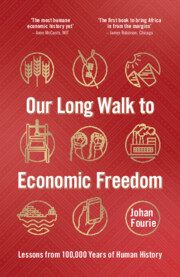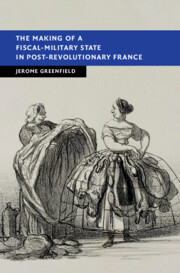Refine search
Actions for selected content:
26945 results in Economic history
Chapter 8 - The Rise and Fall of Austerity, 1848–1856
-
- Book:
- The Making of a Fiscal-Military State in Post-Revolutionary France
- Published online:
- 25 August 2022
- Print publication:
- 01 September 2022, pp 199-233
-
- Chapter
- Export citation
Nazi Billionaires: The Dark History of Germany's Wealthiest Dynasties. By David de Jong. Boston: Mariner Books, 2022. 400 pp. Hardcover, $28.99. Maps, appendix, notes, index. ISBN: 978-1-32849-788-8.
-
- Journal:
- Business History Review / Volume 96 / Issue 3 / Autumn 2022
- Published online by Cambridge University Press:
- 11 November 2022, pp. 693-695
- Print publication:
- Autumn 2022
-
- Article
- Export citation
Contents
-
- Book:
- The Making of a Fiscal-Military State in Post-Revolutionary France
- Published online:
- 25 August 2022
- Print publication:
- 01 September 2022, pp v-v
-
- Chapter
- Export citation
BHR volume 96 issue 3 Cover and Back matter
-
- Journal:
- Business History Review / Volume 96 / Issue 3 / Autumn 2022
- Published online by Cambridge University Press:
- 11 November 2022, pp. b1-b2
- Print publication:
- Autumn 2022
-
- Article
-
- You have access
- Export citation
Acknowledgements
-
- Book:
- The Making of a Fiscal-Military State in Post-Revolutionary France
- Published online:
- 25 August 2022
- Print publication:
- 01 September 2022, pp vii-viii
-
- Chapter
- Export citation
Historia empresarial en América Latina: Temas, debates y problemas [Business History in Latin America: Topics, Debates, and Problems]. Edited by Andrea Lluch, Martín Monsalve Zanatti, and Marcelo Bucheli. Lima: Universidad del Pacífico; Bogotá: Universidad de los Andes, 2021. 335 pp + 30 photos. Hardcover, S/ 50.00. ISBN: 978-958-774-982-3.
-
- Journal:
- Business History Review / Volume 96 / Issue 3 / Autumn 2022
- Published online by Cambridge University Press:
- 11 November 2022, pp. 680-683
- Print publication:
- Autumn 2022
-
- Article
- Export citation
Englishmen at Sea: Labor and the Nation at the Dawn of Empire, 1570–1630. By Eleanor Hubbard. New Haven: Yale University Press, 2021. xiv + 349 pp. Notes, bibliography, index. Cloth, $38.00. ISBN: 978-0-300-24612-4.
-
- Journal:
- Business History Review / Volume 96 / Issue 3 / Autumn 2022
- Published online by Cambridge University Press:
- 11 November 2022, pp. 661-663
- Print publication:
- Autumn 2022
-
- Article
- Export citation
A Global History of Co-operative Business. By Greg Patmore and Nikola Balnave. London and New York: Routledge, 2018. x + 248 pp. References, index. Paperback, $46.95. ISBN: 978-1-13819-149-5.
-
- Journal:
- Business History Review / Volume 96 / Issue 3 / Autumn 2022
- Published online by Cambridge University Press:
- 11 November 2022, pp. 668-671
- Print publication:
- Autumn 2022
-
- Article
- Export citation
Abbreviations
-
- Book:
- The Making of a Fiscal-Military State in Post-Revolutionary France
- Published online:
- 25 August 2022
- Print publication:
- 01 September 2022, pp ix-x
-
- Chapter
- Export citation
Chapter 3 - Developing a Post-Revolutionary Fiscal Politics, 1799–1814
-
- Book:
- The Making of a Fiscal-Military State in Post-Revolutionary France
- Published online:
- 25 August 2022
- Print publication:
- 01 September 2022, pp 39-67
-
- Chapter
- Export citation
Figures and Tables
-
- Book:
- The Making of a Fiscal-Military State in Post-Revolutionary France
- Published online:
- 25 August 2022
- Print publication:
- 01 September 2022, pp vi-vi
-
- Chapter
- Export citation
Jurists and Jurisprudence in Medieval Italy: Texts and Contexts. By Osvaldo Cavallar and Julius Kirshner. Toronto: University of Toronto Press, 2020. 896 pp. Glossary, appendixes, index. Hardcover, $131.00. ISBN: 978-1-4875-0748-0.
-
- Journal:
- Business History Review / Volume 96 / Issue 3 / Autumn 2022
- Published online by Cambridge University Press:
- 11 November 2022, pp. 658-661
- Print publication:
- Autumn 2022
-
- Article
- Export citation
Ages of American Capitalism: A History of the United States
-
- Journal:
- Business History Review / Volume 96 / Issue 3 / Autumn 2022
- Published online by Cambridge University Press:
- 20 September 2022, pp. 647-652
- Print publication:
- Autumn 2022
-
- Article
-
- You have access
- Open access
- HTML
- Export citation
London Couture and the Making of a Fashion Centre. By Michelle Jones. Cambridge, MA: MIT Press, 2022. 320 pp. Illustrations, notes, index. Hardcover, $30.00. ISBN: 978-0-262-04657-2.
-
- Journal:
- Business History Review / Volume 96 / Issue 3 / Autumn 2022
- Published online by Cambridge University Press:
- 11 November 2022, pp. 690-693
- Print publication:
- Autumn 2022
-
- Article
- Export citation
Iran in Motion: Mobility, Space, and the Trans-Iranian Railway. By Mikiya Koyagi. Stanford: Stanford University Press, 2021. 296 pp. Hardcover, $65.00. ISBN: 978-1-5036-131-33.
-
- Journal:
- Business History Review / Volume 96 / Issue 3 / Autumn 2022
- Published online by Cambridge University Press:
- 11 November 2022, pp. 686-688
- Print publication:
- Autumn 2022
-
- Article
- Export citation

Our Long Walk to Economic Freedom
- Lessons from 100,000 Years of Human History
-
- Published online:
- 30 August 2022
- Print publication:
- 04 August 2022

The Making of a Fiscal-Military State in Post-Revolutionary France
-
- Published online:
- 25 August 2022
- Print publication:
- 01 September 2022
Part I - The Long Period
-
- Book:
- The Economics of the Long Period
- Published online:
- 11 August 2022
- Print publication:
- 25 August 2022, pp 7-48
-
- Chapter
- Export citation
8 - The Birth of Institutions
- from Part III - Unified Growth Theory
-
- Book:
- The Economics of the Long Period
- Published online:
- 11 August 2022
- Print publication:
- 25 August 2022, pp 185-203
-
- Chapter
- Export citation
Conclusion: Continuity and Discontinuity in History
- from Part III - Unified Growth Theory
-
- Book:
- The Economics of the Long Period
- Published online:
- 11 August 2022
- Print publication:
- 25 August 2022, pp 224-231
-
- Chapter
- Export citation
